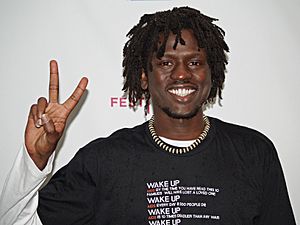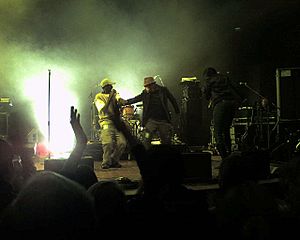Emmanuel Jal facts for kids
Quick facts for kids
Emmanuel Jal
|
|
|---|---|
 |
|
| Background information | |
| Birth name | Jal Jok |
| Born | 1 January 1980 Tonj, Democratic Republic of Sudan (today Tonj, South Sudan) |
| Origin | Toronto, Ontario |
| Genres | Hip-hop |
| Occupations | Political activist, singer, actor |
| Instruments | Vocals |
Emmanuel Jal (born Jal Jok on January 1, 1980) is a South Sudanese-Canadian artist, actor, and author. He is also a former child soldier and a political activist who works for peace. He shared his life story in his 2009 book, War Child: A Child Soldier's Story.
Contents
A Childhood Shaped by War
Emmanuel Jal was born in a small village in what is now South Sudan. He isn't sure of his exact birthday, so he uses January 1, 1980. When he was a young boy, the Second Sudanese Civil War began. This was a long and difficult conflict in his country.
His father joined the Sudan People's Liberation Army (SPLA) to fight in the war. When Jal was about seven years old, his mother was killed. After this tragedy, he decided to walk to Ethiopia with thousands of other children. They were hoping to find safety and a chance to go to school.
Life as a Child Soldier
On the long journey, Jal and many other children were recruited by the SPLA. They were taken to camps that were supposed to be schools. However, the children were secretly trained to become soldiers.
Jal spent several years fighting for the SPLA. He said that many of the children were angry about what had happened to them and their families. When the fighting became too much, Jal and a group of other boys decided to escape. They traveled for three months, and sadly, many did not survive the journey.
A New Beginning in Kenya
Eventually, Jal reached the town of Waat. There, he met a British aid worker named Emma McCune. She believed that children should not be soldiers and decided to help him. She adopted Jal and took him to Kenya, where he could finally attend school.
A few months later, Emma McCune died in an accident. Her friends helped Jal continue his education. He lived with other refugees and worked hard in school. This new life in Kenya gave him a chance for a better future.
Discovering the Power of Music
While living in Kenya, Jal discovered hip hop music. He realized it was a powerful way to talk about important issues and share his feelings. He started singing to help heal from the difficult things he had experienced.
Jal became active in his community, raising money for street children and other refugees. With encouragement from friends, he formed music groups. His first song, "All We Need Is Jesus," became a hit in Kenya.
Music with a Message
Jal uses his music to bring people together and inspire young people in Sudan. He felt that hip-hop was the best way to share his story and call for peace.
His first album was called Gua. The title has two meanings: "peace" in his native Nuer language and "power" in Sudanese Arabic. The album mixes rap with different languages, including Arabic, English, Swahili, Dinka, and Nuer. The main song, also called "Gua," was a number one hit in Kenya.
His second album, Ceasefire, was a team project with a famous Sudanese Muslim musician, Abd El Gadir Salim. Jal is a Christian, so their collaboration was a powerful symbol of unity. It showed that people from different backgrounds could work together for peace.
Working for a Better World
Jal believes that music can change the world. He says music is powerful because it can reach people's hearts and minds. He uses his songs to tell the world about the need for peace and to say that children should never be part of wars.
He is a spokesperson for groups like the Make Poverty History campaign and the Coalition to Stop the Use of Child Soldiers. He wants to use his voice to protect other children from going through what he did.
Gua Africa Charity
One of Jal's greatest passions is his charity, Gua Africa. The organization helps people affected by war and poverty. It builds schools in South Sudan and provides scholarships for war survivors living in refugee camps.
In 2008, Jal started a "Lose to Win" challenge to raise money to build a school. For 661 days, he ate only one meal a day to raise awareness and funds. The school was named the Emma Academy in honor of the woman who saved him.
Creative Works
Jal has shared his story and message through music, films, and a book.
Discography
- Solo albums
- 2004 – Gua
- 2005 – Ceasefire
- 2008 – Warchild
- 2010 – Emmanuel Jal's 4th Studio Album
- 2012 – See Me Mama
- 2014 – The Key
- 2022 – Shangah
- Collaborative albums
- 2018 - Naath, with his sister Nyaruach
Filmography
| Year | Film | Role | Genre |
|---|---|---|---|
| 2008 | War Child | Emmanuel Jal | Documentary |
| 2010 | Africa United | Tulu | Drama |
| 2014 | The Good Lie | Paul | Drama |
Book
- War Child: A Child Soldier's Story (2009)
 | Calvin Brent |
 | Walter T. Bailey |
 | Martha Cassell Thompson |
 | Alberta Jeannette Cassell |


